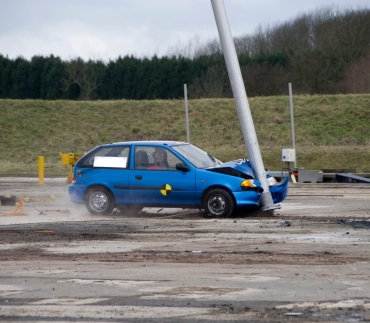Transpo's Pole-Safe® Omni-Directional Breakaway Post Support System features couplings designed to be used on poles located within roadside clear zones and other locations vulnerable to impacts. The primary component of the system is a high-strength coupling, engineered to break away quickly and cleanly upon impact. The poles break in a consistent, predictable fashion, regardless of the vehicle's angle of impact, thus saving lives and reducing property damage.
Find a distributor now.
Features and Advantages
- superior breakaway performance
- offers exceptional resistance to forces created by wind and dead loads
- designed for use with maximum allowable pole mass specified by AASHTO
- can be used on a large range of light pole sizes and configurations
- no special tools or equipment needed for installation
- couplings and hardware are hot-dip galvanized in accordance with ASTM A153 to provide corrosion-protection
- no torque requirement and maintenance free
Tested and Proven
In use in the United States since the 1970's
Extensive finite element analysis and simulated wind-load testing has been used to optimize the system. Independent fatigue testing has demonstrated that Pole-Safe® couplings are capable of withstanding more than two million loading cycles with no reduction in structural capacity.
Pole-Safe® vehicle crash tests were conducted in accordance with NCHRP Report 350 using a 55 foot high, 930 pound pole. Please see our memo regarding non-standard use.
Low initial cost along with high structural capacity and zero maintenance makes the Pole-Safe® Omni-Directional Breakaway Support System the most cost-effective solution for all breakaway applications.
As per FAA Circular Advisory on Frangible Connections (AC150/ 5220-23) and ICAO Design Manual Part 6 on Frangibility, objects such as navigational or visual aids placed within designated safety area are required to be of minimal mass and height, mounted as low as possible to the ground, and to be mounted on frangible support structures. The FAA Circular Advisory has Pole-Safe for airfields listed as the only approved fuse bolt by the FAA
Breakaway Post Support Standards
Various standards are used around the world for highway and roadway safety features. A goal of a highway safety feature is to provide a forgiving roadway and roadside for an errant motorist. The safety goal is met when the feature either contains and redirects the vehicle away from a hazardous area, decelerates the vehicle to a stop over a relatively short distance, readily breaks away or fractures or yields, allows a controlled penetration, or is traversable, without causing serious injuries to the vehicle's occupants or to other motorists, pedestrians, or work zone personnel.
NCHRP 350
Recommended Procedures for the Safety Performance Evaluation of Highway Features
MASH and NCHRP 350 represent uniform guidelines for conducting full-scale crash tests for permanent and temporary highway safety features along with recommended evaluation criteria to access the test results. The crash performance is judged on structural adequacy, occupant risk and vehicle trajectory.
EN 12767
Passive Safety of Road Infrastructure
According to EN 12767, the definition of Non-energy absorbing support structures permit the vehicle to continue after impact with a limited reduction in speed. Non energy absorbing support structures may provide a lower primary injury risk than energy absorbing support structures.


